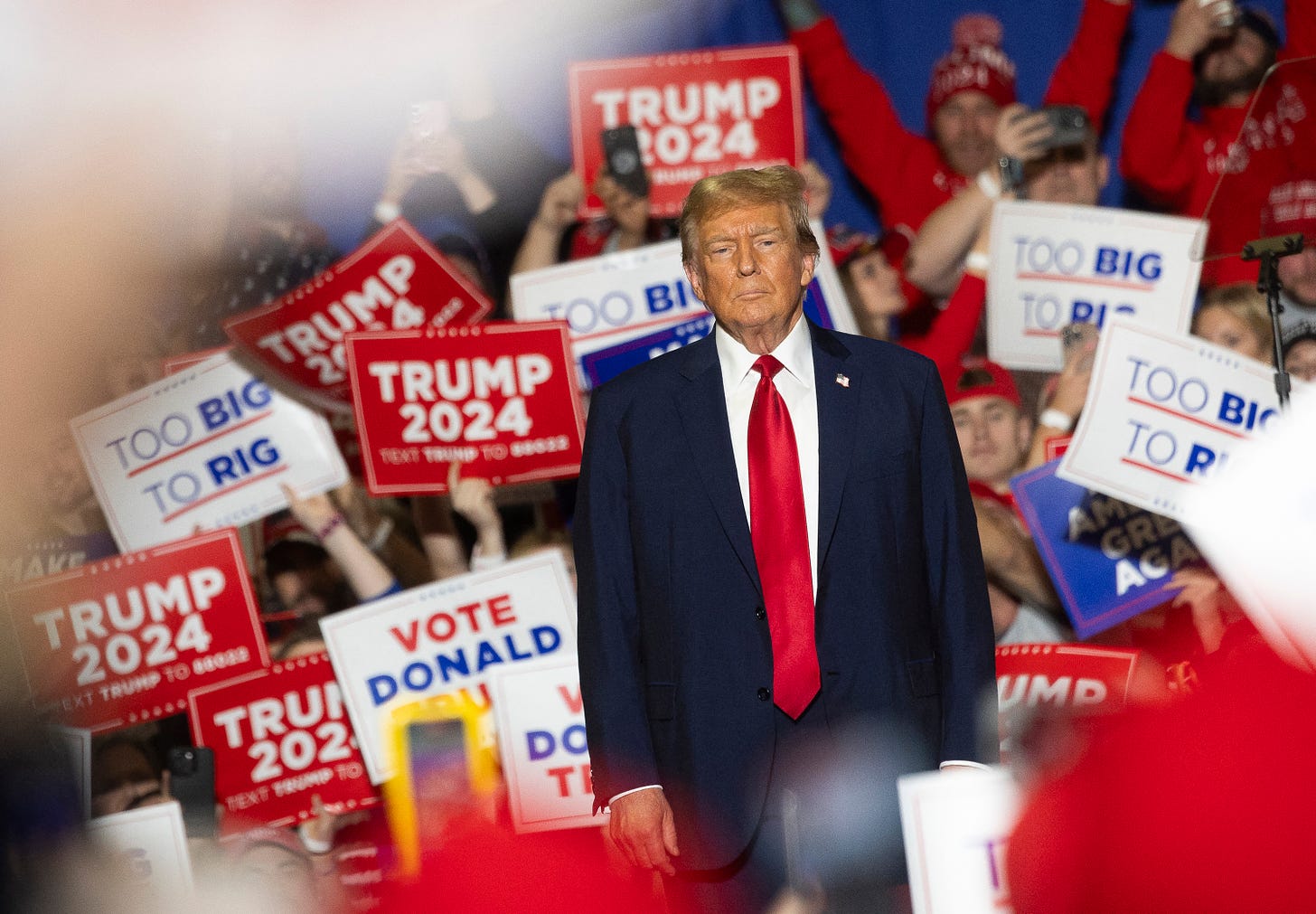Don’t Despair: Trump Can Still Be Held Accountable
In the courtroom and in the voting booth, his victory is not inevitable.

IT’S ALL TOO EASY TO LOSE HOPE these days if you’re looking to the courts to help save us from the threat Donald Trump poses to American democracy. Last week, the Supreme Court agreed to hear Trump’s baseless claim to presidential immunity in Jack Smith’s January 6th prosecution, handing Trump the gift of several months’ delay. And this morning, the Court is expected to rule in the case covering whether states can keep Trump off the ballot for having engaged in insurrection. Based on the oral argument in the case, few will be surprised if the justices rule in Trump’s favor.
But there’s every reason to resist despair’s siren song and not fall for the line you sometimes hear that Trump “gets away with everything.” That’s exactly what he wants us to believe. As historian Ruth Ben-Ghiat noted last fall, wannabe dictators try to project an image of invulnerability and omnipotence, when it’s far from true.
“I alone can fix it,” Trump famously said in 2016. Not only did he not fix it; he also nearly broke it and is trying to do it again.
STEP BACK AND LOOK at the big picture of legal proceedings.
First, on the civil fraud side, New York Attorney General Letitia James has held Trump to account with a $454 million judgment. On top of that, a New York appellate court last week required, over Trump’s feckless in-court protest, that he bend to the legal rule that he has to post a bond or get a loan to cover the entire amount if he wants to keep his cash and properties from being seized while he appeals.
Second, there’s the courageous E. Jean Carroll’s case in which Trump owes $83 million. In that case, too, he is trying to escape his bond requirement on appeal. Watch how Judge Lewis Kaplan, the tough-minded federal judge who called Trump’s conduct “rape,” again turns Trump’s plea away.
Third, and most importantly, Trump’s day of reckoning before a jury in Alvin Bragg’s 2016 election interference case begins on March 25. It’s strong, important, and Trump can’t stop it.
He can’t stop it because, far from being invulnerable, he’s exposed his Achilles’ heel. As is typical of those who overcompensate for their own sense of weakness, Trump has constantly been trying to project strength, counterattacking on every front. In Bragg’s case, Trump’s ill-considered counterattack led him into an ambush of his own making.
Perhaps you’ve noticed that Trump has not claimed immunity in the New York case as he did in the federal indictments in Washington, D.C. and Florida. It seems that in his Manhattan case, Trump unintentionally gave up the claim he’s used for delay elsewhere through a goofup relating to his characteristic overaggressiveness.
Bear with me here. Last May, a few weeks after the Manhattan grand jury indicted Trump, he instructed his lawyers to “remove” the case to federal court. He claimed that the actions for which the grand jury indicted him were part of his “official duties” as president.
He lost. By making the claim for removal and losing, he surrendered his much more important ability to delay the trial by filing a motion for immunity, and appealing it, as he has done in D.C.
Why? Because under the law’s doctrine of “issue preclusion,” a party only gets one bite at the apple of making a specific legal claim. Trump’s claim for immunity rested on the same legal theory as the one rejected when he sought to remove the New York prosecution: that he was acting within his official presidential responsibilities. Having lost the issue in that context, he can’t go back and make the same argument in a different context for a different purpose.
Boom. There went Trump’s ability to delay his New York case based on immunity. Trump is vulnerable to the rules set by the law even if he escapes them more often than most who cross its lines. His mistake has him on schedule to be tried in New York in time for a jury verdict before summer.
The importance of Bragg’s case is not to be minimized. It’s all about Trump’s election interference in 2016. He covered up a scandal—his affair with Stormy Daniels—that would have been a one-two punch immediately after the Access Hollywood tape emerged.
He kept the American people from having full information about him, just as he has been trying to do in 2024 to prevent his criminal cases from reaching a jury verdict. But he’s failed mightily in Bragg’s case. You can count on the Manhattan trial team to properly message to jurors and to America that Trump’s coverup was a fraud on the electorate and a fraud on history.
ONE LAST POINT that goes beyond the courts. There’s an even more important truth to keep in mind about Trump being deeply vulnerable.
Elections are where politicians’ accountability really happens. Polls keep overestimating Trump’s actual performance in this year’s Republican primaries. And all the hand-wringing before elections in 2018, 2020, 2022, and 2023 turned out to be wasted when people were active in defending our right to control our government and our right to organize and vote. In contested elections, Trump and his candidates have lost time after time.
In other words, Trump and his movement are not inevitable. And it will be a victory for our constitutional republic if we each do our own small part in preserving it.





